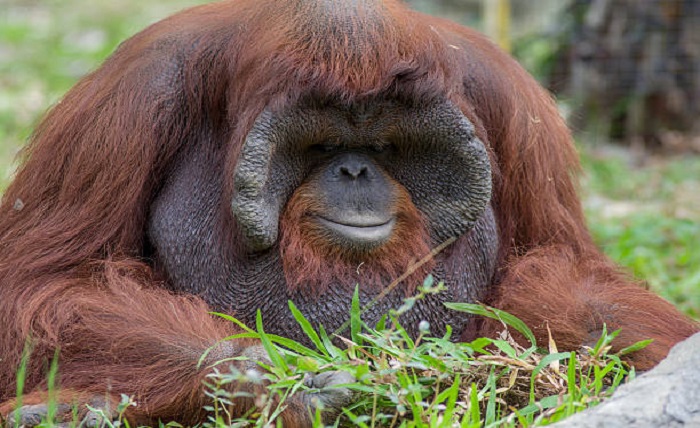Fat Monkeys: The Causes and Consequences of Obesity in Primates

Monkeys are among the most intelligent and adaptable animals on the planet. They can live in various habitats, from tropical rainforests to urban cities, and can interact with humans in various ways, from being pets to being pests. However, some of these interactions can have negative effects on the health and well-being of monkeys, especially when it comes to their diet and nutrition. In this blog post, we will explore the causes and consequences of obesity in primates, using the example of Uncle Fatty, a famous obese macaque from Thailand.
Who is Uncle Fatty?
Uncle Fatty is a male long-tailed macaque who lives near a floating food market in Bangkok, Thailand. He became famous in 2017 when pictures of his enormous size went viral on social media. He weighed about 33 lbs (15 kg), which is more than twice the normal weight for his species. He earned his nickname from tourists who loved to feed him junk food, such as noodles, corn, milkshakes, and melons. He also had a group of followers who brought him more food and protected him from other monkeys.
Uncle Fatty’s obesity attracted the attention of wildlife officials and conservationists, who decided to rescue him and put him on a weight-loss program. He was moved to a wildlife center 100 miles (161 km) away from his home, where he was given a healthy diet of lean protein and vegetables, and an exercise regimen of running and swinging with other animals. After four months, he lost about 4.4 lbs (2 kg), which was a significant improvement for his health and condition.
What causes obesity in monkeys?
Obesity in monkeys is mainly caused by consuming excess calories from human food, especially sugary and fatty foods. Monkeys are omnivorous animals, which means they can eat both plant and animal matter. In their natural habitats, they usually eat fruits, seeds, leaves, flowers, insects, eggs, and small vertebrates. However, when they live near human settlements or tourist attractions, they often have access to human food, such as bread, chips, candy, soda, and meat. These foods are high in calories, but low in nutrients and fiber. They also trigger the release of dopamine, a neurotransmitter that induces pleasure and reward in the brain. This makes monkeys crave more of these foods and overeat them.
Another factor that contributes to obesity in monkeys is the lack of physical activity. Monkeys are naturally active animals that spend most of their time foraging, traveling, playing, and grooming. These activities help them burn calories and maintain their muscle mass and metabolism. However, when monkeys have easy access to human food, they tend to reduce their activity levels and become more sedentary. They also lose their natural instincts and skills to find food in the wild. This leads to weight gain and muscle loss.
What are the consequences of obesity in monkeys?
Obesity in monkeys can have serious consequences for their health and survival. Some of these consequences are similar to those found in humans, such as:
- Increased risk of metabolic diseases, such as diabetes, high blood pressure, high cholesterol, and fatty liver.
- Increased risk of cardiovascular diseases, such as heart attack, stroke, and heart failure.
- Increased risk of joint problems, such as arthritis, osteoarthritis, and gout.
- Increased risk of respiratory problems, such as asthma, sleep apnea, and pneumonia.
- Increased risk of reproductive problems, such as infertility, low libido, and erectile dysfunction.
- Decreased immunity and increased susceptibility to infections and parasites.
- Decreased lifespan and quality of life.
Obesity in monkeys can also have negative effects on their behavior and social interactions. Some of these effects are:
- Reduced mobility and agility.
- Reduced dominance and status.
- Reduced grooming and hygiene.
- Reduced communication and cooperation.
- Increased aggression and conflict.
- Increased stress and anxiety.
How can we prevent obesity in monkeys?
Obesity in monkeys is largely preventable by limiting their exposure to human food and encouraging their natural behaviors. Some of the ways we can do this are:
- Educating people about the dangers of feeding monkeys human food.
- Enforcing laws and regulations that prohibit feeding monkeys human food.
- Providing alternative sources of natural food for monkeys in urban areas or tourist sites.
- Restoring or protecting the natural habitats of monkeys from deforestation or degradation.
- Rehabilitating or relocating obese monkeys to suitable wildlife centers or sanctuaries.
- Supporting research and conservation efforts that aim to improve the health and welfare of monkeys.
Conclusion
Fat monkeys are not cute or funny, but rather a sign of a serious problem that affects both humans and animals. Obesity in monkeys is caused by consuming excess calories from human food and lacking physical activity. Obesity in monkeys can lead to various health problems, such as diabetes, heart disease, and arthritis, as well as behavioral problems, such as aggression, stress, and isolation. Obesity in monkeys can be prevented by limiting their access to human food and promoting their natural behaviors. By doing so, we can help monkeys live healthier and happier lives.
Read more about: sportsgurupro




